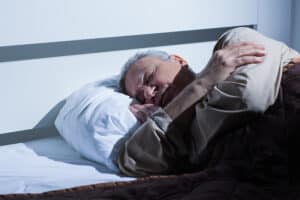
If you’re a family caregiver who spends the overnight hours with an older adult, you may be aware that older adults often have trouble sleeping. They may not be able to fall asleep or they may sleep for a short time and then wake up, unable to get back to sleep. Unfortunately, when they’re up, you’re up. That means neither one of you is getting enough sleep. Figuring out what’s causing the senior’s sleeplessness is the first step in helping them to sleep better. A new study suggests that for some seniors, light pollution could be the problem.
About the Study
Researchers examined the medical records of 50,000 participants, all of whom were over the age of 60. Approximately 22 percent of them used hypnotic medications to treat insomnia. Upon further examination, seniors who lived in communities where there was more outdoor lighting at night, such as street lamps, used a greater amount of hypnotic drugs. They either took the drugs over a longer period of time or took higher doses. The researchers concluded that light pollution was a factor in insomnia.
Other Possible Causes of Sleep Problems
There are different kinds of problems that can affect your aging relative’s sleep, including:
- Trouble falling asleep.
- Getting fewer hours of sleep.
- Waking up often.
- Having poorer quality sleep.
These problems can be caused by a lot of things that go hand-in-hand with growing older. Some common causes of sleep problems in the elderly are:
- Primary Sleep Disorders: These are sleep disorders that are not caused by an underlying problem or condition.
- Medical Conditions: Medical conditions can affect sleep because of pain or discomfort. Or, daytime inactivity because of the disease may result in them not using up enough energy during the day to feel tired at night.
- Medications: There are lots of medications that have sleeplessness as a side effect or that can interrupt sleep.
- Caffeine, Alcohol, and Nicotine: All of these substances are stimulants that can prohibit sleep.
If your aging relative is having difficulty sleeping, it’s a good idea to first speak with their doctor to determine if a medication or condition is the cause. Once those have been treated or ruled out, examine habits that could be affecting sleep, such as drinking caffeine too close to bedtime.
Senior care can also help your aging relative to sleep better at night. A senior care provider can keep them more active during the day to promote better sleep at night. Senior care providers can also help them stick to a schedule, which can help cue their bodies when it is time to sleep.
Sources
https://www.aarp.org/health/conditions-treatments/info-2018/light-pollution-insomnia.html?intcmp=AE-HP-TTN-R3-POS1-REALPOSS-TODAY
https://www.healthline.com/health/sleep/sleep-disorders-in-the-elderly
If you or an aging loved one are considering senior care in Memorial, TX, please call the caring staff at At Your Side Home Care. We will answer all of your senior care questions. Call today: (832) 271-1600.
Our Certified Nurse Aides, 24-Hour Live-in Assistants and Home Health Aides are available 24 hours a day, 365 days a year. We also provide the security and confidence of 24-hour Telephone Assistance, so fast, reliable help is always available when it's needed. To learn more about our homecare services see our homecare services page.
Different people need different levels of homecare. To meet the requirements of our clients, At Your Side Homecare maintains consistent staffing levels of caring professionals. Homecare service is available for as little as a few hours a week, or as many as 24 hours a day, seven days a week
- 5 Signs a Senior Might Be in the Beginning Stages of Dementia - April 25, 2025
- What Solutions Can Help Seniors with Mental Health Challenges? - April 18, 2025
- How Does Senior Home Care Help Make Aging in Place Possible? - April 11, 2025



